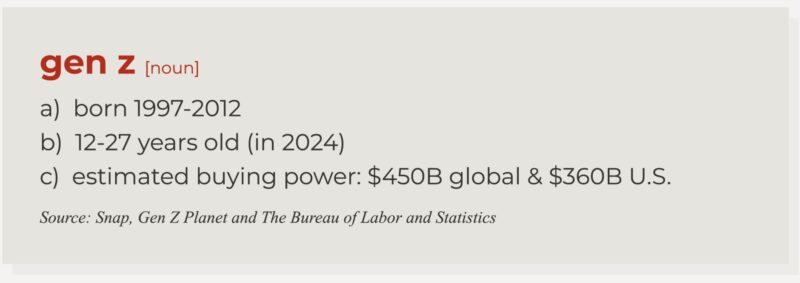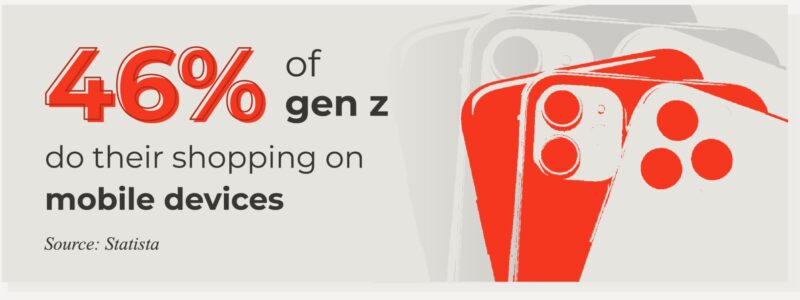As Gen Z comes of age, marketers are shifting strategies to reach this young, vocal, and powerful generation of consumers. With $450 billion in global buying power, there has been a rush for companies to connect, which has led to both high-profile successes and cringe-worthy missteps. Consumer company leaders have been reminded of the critical need for marketing executives who understand Gen Z and can capture their market share.

The transition to a new generation of buyers requires a change in the desired experiences and competencies of senior marketing leadership. To help companies gear their marketing efforts toward a Gen Z future, True’s global Consumer practice outlines how to identify and attract this vital talent.

Digitally Savvy
It’s not enough today for a consumer brand to be on social media. Gen Z has been digital since childhood (or infancy), and they are consuming most of their media, communicating with friends, and doing 46% of their shopping on their mobile devices.

Shella Abe, co-head of True’s Consumer practice, emphasizes how social platforms are fundamentally changing the way people shop.

Their shopping habits are impacting their parents’ buying decisions too. The National Retail Federation surveyed Gen Z parents and 87% said their children influenced their purchase decisions.
All this means mastery of social media platforms, and the customer experience on them, isn’t just a “nice-to-have” skill anymore. True is increasingly seeing an emphasis on prior experience building digital community through social channels become an official part of the job description for chief marketing officers.
Consumer practice co-head Hannah James recounted how her team recently sought out leaders who had created “viral moments” in an executive search for a CMO for a global audio streaming brand. They were looking at executives with previous experience in totally different product categories to create a list of top executives with that social “virality” factor.
“It’s crucial for CMOs to recognize shopping behaviors,” James said. “Gen Z primarily connects through phones and devices. Marketing leaders need to understand this dynamic and meet them where they are.”
Lead Authentic Engagement
Gen Z consumers are known to crave authenticity and transparency in the brands they support.

A marketing leader must be able to establish an “authentic” company persona and then carry that consistently through the brand’s platforms and ESG. Marketing leaders must work cross-functionally to ensure the company knows the brand ethos and that all departments and employees can “walk the talk” when it comes to supporting socially conscious and responsible causes relevant to the brand.
A company going against its publicized values is a TikTok controversy waiting to happen, like when a baby-brand CEO fired an employee instead of granting her work-from-home status to be with a child in the NICU. Gen Z is watching and can spot performative goodness a mile away.
Ogilvy’s 2024 Social Media Trends Report found culture and authenticity are at the forefront of today’s successful social media.
Understands Influencer Marketing
Fluency in influencer partnerships has also become critical. Goldman Sachs forecasted in 2023 that the addressable market of the creator economy could reach $480 billion by 2027. Gen Z’s constant online presence, and affinity and exposure to influencers, help shape their opinions and purchasing behavior.
The impact is evident. Whenever a popular influencer says ‘Hey, this lip oil is amazing,’ it can sell out instantly. Candy brand Nerds took the hint and enlisted the help of mega-influencer and TikTok celebrity, Addison Rae, to star in their recent Super Bowl commercial and drew a new audience to their older brand.
Marketing budgets are aligning with this reality. Spending on sponsored partnerships rose 3.5x faster in 2023 than social ad spending, according to Ogilvy.

True is seeing the importance of understanding influencers in executive searches for high-profile roles. A recent search for a head of consumer marketing at a global tech marketplace landed on an exec who had previously led a major media company’s influencer marketing. That “creator understanding” was a top requirement for the role, which is a major departure from searches of the past.
Experience Building Community
Modern marketers aligned with Gen Z also need to know how to build and engage communities of consumers in consistent, captivating, and increasingly innovative ways, says Kristyna Smetanova, London-based Consumer practice partner.

The marketers at True client e.l.f. Beauty take this approach, engaging with potential Gen Z customers on platforms with “built-in community” like Roblox, Twitch and Tik Tok. The nearly two-decade-old company gets one-third of its customers from Gen Z.
True client, VIEVE, the global beauty and lifestyle brand from Scottish makeup artist and digital creator, Jamie Genevieve, emphasizes its digital-first and emotional connection with its community. True recently led the search for their Chief Customer Experience Officer, whose mission is to drive D2C expansion and a customer-first agenda across all functions and touchpoints.
It is worth noting that the new leader comes from outside the beauty sector, but exemplifies the requirements of the role. She came from a highly customer and community-centric GM e-Commerce background with a record of helping digitally native brands achieve global success.
Berlin-based True Consumer partner Cristina-Elena Pestrea says, increasingly, European Union marketing leaders understand the importance of building community on social channels, even if some smaller brands can be constrained by financial reasons or difficulty navigating strict GDPR (privacy) regulations.

A Well-Rounded Marketer
There are some qualities that companies are looking for in their leaders that haven’t changed. Executives that deeply connect with the values and mission of the brand will always be attractive to companies. True Search data shows “leadership” has been a key attribute on True scorecards for marketing leaders for much of the last 10 years, with “marketing excellence” pushing “leadership” to second place for 2022 and 2023.
“Many companies continue to search for the elusive full-stack marketer, someone who can skillfully navigate both brand strategy and growth marketing with a keen focus on data,” Abe said. “Finding individuals with expertise in both areas can be a complex endeavor.”
And while the technologies have changed, the need to learn and deploy new tools and tech has not. Where in the past marketing leaders adapted to an online and social environment, today they’re utilizing the technologies that revolutionize consumer experiences: in particular AI-enabled hyper personalization, Metaverse experiences, NFTs and other digital art. Sometimes those marketing leaders will need to come from outside industries to meet all the old and new qualifications.
Marketers and the companies that need them must become attuned to this influential and large generation by speaking to their priorities and values. To be future-forward, consumer marketing leaders will need to have the experiences and competencies to adjust to Gen Z and their preferences.
